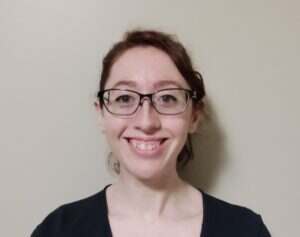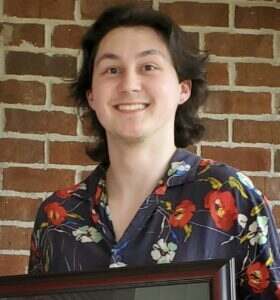
The 2022 UM 3MT Winner Kendall Wontor
JANUARY 17, 2023 BY MARGARET SAVOIE FOR THE UM GRADUATE SCHOOL WINTER NEWSLETTER
Drum roll please… the 2022 Three Minute Thesis (3MT®) overall winner is Kendall Wontor, a doctoral chemistry student! Wontor’s research focuses on microplastics in oysters.
Wontor spent most of her childhood in Texas but most recently lived in Hawaii before relocating to Mississippi. Her time in Hawaii sparked her interest in microplastics.
“I loved going to the beach,” said Wontor. “As a chemist, seeing all the plastics wash up on the shore made me curious about the breakdown pathway of plastics and the characteristics of microplastics in the environment.”
“Microplastics are a diverse suite of contaminants with different polymers, additives, sizes, and morphologies. Microplastics can also attract other pollutants, such as heavy metals, potentially introducing them into the food chain as the plastic is caught on gills or mistaken for prey,” explained Wontor’s advisor, Dr. James V. Cizdziel, professor of chemistry and biochemistry and coordinator of forensic chemistry.
Specifically, Wontor’s research uses analytical chemistry to answer questions about microplastics in the environment. Wontor has multiple current research projects in both Mississippi Gulf Coast oysters and the Mississippi River system. Some of the questions include: (1) how many microplastics are present, (2) what type of plastics are they made of, (3) what size and shape are they, and (4) can we find a potential source of some of these microplastics. Answers to these questions play an essential role in understanding the risk microplastics pose to both humans and the environment, as well as the ability to target clean-up efforts.
“Microplastics are abundant in the Mississippi River and Mississippi Sound. Oysters are exposed to these small plastic particles. This is a concern because oysters are filter-feeders and the microplastics may interfere with oyster biology. Oysters are a foundational species in the Gulf and an economic resource to the region,” explained Cizdziel.
“I would love to be able to continue my research on microplastics as a professor at the university level,” said Wontor. Such a position would not only allow her to continue learning and discovering but would also allow her to share her knowledge with the next generation of scientists.
Wontor is no stranger to presenting her research. She presented “Microplastics in Oysters from the Mississippi Sound” at the National Environmental Monitoring Conference in a special session on “Analyzing Microplastics in the Environment: Striving to Better Assess Occurrence, Fate and Effects.” She will represent UM this year at the regional competition in Tampa in March 2023.
Tied for Second Place Master’s

Mitchell Roberts, tied for second place masters
Mitchell Roberts, a philosophy master’s student from Florida, and Preethi Lakkala, a masters student in pharmaceutics from India tied for second place in the Master’s category in the 2022 3MT®.
Roberts presented his research, which is concerned with the philosophical question of how one can know whether technology can embody moral values independent of its use. For example, how do we know whether guns are “bad” or medicine is “good.” Roberts argues that to answer this question accurately, one should attend to how technology is normally used, but also attend to how it is abnormally used.
“I am interested in getting my Ph.D. beyond this and furthering my research on the philosophy of technology,” said Roberts, “I’m really interested in working with students and getting other people excited about questions they didn’t even know they had about the world.”